- Home
- Jack London
The Little Lady of the Big House Page 8
The Little Lady of the Big House Read online
Page 8
And then Dick chanted, lisping:
«The goldfish thwimmeth in the bowl,
The robin thiths upon the tree;
What maketh them thit so eathily?
Who stuckth the fur upon their breasths?
God! God! He done it!»
«Cribbed,» was Ernestine's judgment, as the laughter died away.
«Sure,» Dick agreed. «I got it from the Rancher and Stockman , that got it from the Swine Breeders' Journal , that got it from the Western Advocate , that got it from Public Opinion , that got it, undoubtedly, from the little girl herself, or, rather from her Sunday School teacher. For that matter I am convinced it was first printed in Our Dumb Animals .»
The bronze gong rang out its second call, and Paula, one arm around Dick, the other around Rita, led the way into the house, while, bringing up the rear, Bert Wainwright showed Lute Ernestine a new tango step.
«One thing, Thayer,» Dick said in an aside, after releasing himself from the girls, as they jostled in confusion where they met Thayer and Naismith at the head of the stairway leading down to the dining room. «Before you leave us, cast your eyes over those Merinos. I really have to brag about them, and American sheepmen will have to come to them. Of course, started with imported stock, but I've made a California strain that will make the French breeders sit up. See Wardman and take your pick. Get Naismith to look them over with you. Stick half a dozen of them in your train-load, with my compliments, and let your Idaho sheepmen get a line on them.»
They seated at a table, capable of indefinite extension, in a long, low dining room that was a replica of the hacienda dining rooms of the Mexican land-kings of old California. The floor was of large brown tiles, the beamed ceiling and the walls were whitewashed, and the huge, undecorated, cement fireplace was an achievement in massiveness and simplicity. Greenery and blooms nodded from without the deep– embrasured windows, and the room expressed the sense of cleanness, chastity, and coolness.
On the walls, but not crowded, were a number of canvases—most ambitious of all, in the setting of honor, all in sad grays, a twilight Mexican scene by Xavier Martinez, of a peon, with a crooked– stick plow and two bullocks, turning a melancholy furrow across the foreground of a sad, illimitable, Mexican plain. There were brighter pictures, of early Mexican-Californian life, a pastel of twilight eucalyptus with a sunset-tipped mountain beyond, by Reimers, a moonlight by Peters, and a Griffin stubble-field across which gleamed and smoldered California summer hills of tawny brown and purple– misted, wooded canyons.
«Say,» Thayer muttered in an undertone across to Naismith, while Dick and the girls were in the thick of exclamatory and giggling banter, «here's some stuff for that article of yours, if you touch upon the Big House. I've seen the servants' dining room. Forty head sit down to it every meal, including gardeners, chauffeurs, and outside help. It's a boarding house in itself. Some head, some system, take it from me. That Chiney boy, Oh Joy, is a wooz. He's housekeeper, or manager, of the whole shebang, or whatever you want to call his job—and, say, it runs that smooth you can't hear it.»
«Forrest's the real wooz,» Naismith nodded. «He's the brains that picks brains. He could run an army, a campaign, a government, or even a three-ring circus.»
«Which last is some compliment,» Thayer concurred heartily.
«Oh, Paula,» Dick said across to his wife. «I just got word that Graham arrives to-morrow morning. Better tell Oh Joy to put him in the watch-tower. It's man-size quarters, and it's possible he may carry out his threat and work on his book.»
«Graham?—Graham?» Paula queried aloud of her memory. «Do I know him?»
«You met him once two years ago, in Santiago, at the CafГ© Venus. He had dinner with us.»
«Oh, one of those naval officers?»
Dick shook his head.
«The civilian. Don't you remember that big blond fellow—you talked music with him for half an hour while Captain Joyce talked our heads off to prove that the United States should clean Mexico up and out with the mailed fist.»
«Oh, to be sure,» Paula vaguely recollected. «He'd met you somewhere before… South Africa, wasn't it? Or the Philippines?»
«That's the chap. South Africa, it was. Evan Graham. Next time we met was on the Times dispatch boat on the Yellow Sea. And we crossed trails a dozen times after that, without meeting, until that night in the CafГ© Venus.
«Heavens—he left Bora-Bora, going east, two days before I dropped anchor bound west on my way to Samoa. I came out of Apia, with letters for him from the American consul, the day before he came in. We missed each other by three days at Levuka—I was sailing the Wild Duck then. He pulled out of Suva as guest on a British cruiser. Sir Everard Im Thurm, British High Commissioner of the South Seas, gave me more letters for Graham. I missed him at Port Resolution and at Vila in the New Hebrides. The cruiser was junketing, you see. I beat her in and out of the Santa Cruz Group. It was the same thing in the Solomons. The cruiser, after shelling the cannibal villages at Langa-Langa, steamed out in the morning. I sailed in that afternoon. I never did deliver those letters in person, and the next time I laid eyes on him was at the CafГ© Venus two years ago.»
«But who about him, and what about him?» Paula queried. «And what's the book?»
«Well, first of all, beginning at the end, he's broke—that is, for him, he's broke. He's got an income of several thousand a year left, but all that his father left him is gone. No; he didn't blow it. He got in deep, and the 'silent panic' several years ago just about cleaned him. But he doesn't whimper.
«He's good stuff, old American stock, a Yale man. The book—he expects to make a bit on it—covers last year's trip across South America, west coast to east coast. It was largely new ground. The Brazilian government voluntarily voted him a honorarium of ten thousand dollars for the information he brought out concerning unexplored portions of Brazil. Oh, he's a man, all man. He delivers the goods. You know the type—clean, big, strong, simple; been everywhere, seen everything, knows most of a lot of things, straight, square, looks you in the eyes—well, in short, a man's man.»
Ernestine clapped her hands, flung a tantalizing, man-challenging, man-conquering glance at Bert Wainwright, and exclaimed: «And he comes tomorrow!»
Dick shook his head reprovingly.
«Oh, nothing in that direction, Ernestine. Just as nice girls as you have tried to hook Evan Graham before now. And, between ourselves, I couldn't blame them. But he's had good wind and fast legs, and they've always failed to run him down or get him into a corner, where, dazed and breathless, he's mechanically muttered 'Yes' to certain interrogatories and come out of the trance to find himself, roped, thrown, branded, and married. Forget him, Ernestine. Stick by golden youth and let it drop its golden apples. Pick them up, and golden youth with them, making a noise like stupid failure all the time you are snaring swift-legged youth. But Graham's out of the running. He's old like me—just about the same age—and, like me, he's run a lot of those queer races. He knows how to make a get-away. He's been cut by barbed wire, nose-twitched, neck-burnt, cinched to a fare-you-well, and he remains subdued but uncatchable. He doesn't care for young things. In fact, you may charge him with being wobbly, but I plead guilty, by proxy, that he is merely old, hard bitten, and very wise.»
CHAPTER IX
«Where's my Boy in Breeches?» Dick shouted, stamping with jingling spurs through the Big House in quest of its Little Lady.
He came to the door that gave entrance to her long wing. It was a door without a knob, a huge panel of wood in a wood-paneled wall. But Dick shared the secret of the hidden spring with his wife, pressed the spring, and the door swung wide.
«Where's my Boy in Breeches?» he called and stamped down the length of her quarters.
A glance into the bathroom, with its sunken Roman bath and descending marble steps, was fruitless, as were the glances he sent into Paula's wardrobe room and dressing room. He passed the short, broad stairway that led to her empty window-
seat divan in what she called her Juliet Tower, and thrilled at sight of an orderly disarray of filmy, pretty, lacy woman's things that he knew she had spread out for her own sensuous delight of contemplation. He fetched up for a moment at a drawing easel, his reiterant cry checked on his lips, and threw a laugh of recognition and appreciation at the sketch, just outlined, of an awkward, big-boned, knobby, weanling colt caught in the act of madly whinneying for its mother.
«Where's my Boy in Breeches?» he shouted before him, out to the sleeping porch; and found only a demure, brow-troubled Chinese woman of thirty, who smiled self-effacing embarrassment into his eyes.
This was Paula's maid, Oh Dear, so named by Dick, many years before, because of a certain solicitous contraction of her delicate brows that made her appear as if ever on the verge of saying, «Oh dear!» In fact, Dick had taken her, as a child almost, for Paula's service, from a fishing village on the Yellow Sea where her widow-mother earned as much as four dollars in a prosperous year at making nets for the fishermen. Oh Dear's first service for Paula had been aboard the three-topmast schooner, All Away , at the same time that Oh Joy, cabin-boy, had begun to demonstrate the efficiency that enabled him, through the years, to rise to the majordomoship of the Big House.
«Where is your mistress, Oh Dear?» Dick asked.
Oh Dear shrank away in an agony of bashfulness.
Dick waited.
«She maybe with 'm young ladies—I don't know,» Oh Dear stammered; and
Dick, in very mercy, swung away on his heel.
«Where's my Boy in Breeches?» he shouted, as he stamped out under the porte cochГЁre just as a ranch limousine swung around the curve among the lilacs.
«I'll be hanged if I know,» a tall, blond man in a light summer suit responded from the car; and the next moment Dick Forrest and Evan Graham were shaking hands.
Oh My and Oh Ho carried in the hand baggage, and Dick accompanied his guest to the watch tower quarters.
«You'll have to get used to us, old man,» Dick was explaining. «We run the ranch like clockwork, and the servants are wonders; but we allow ourselves all sorts of loosenesses. If you'd arrived two minutes later there'd have been no one to welcome you but the Chinese boys. I was just going for a ride, and Paula—Mrs. Forrest—has disappeared.»
The two men were almost of a size, Graham topping his host by perhaps an inch, but losing that inch in the comparative breadth of shoulders and depth of chest. Graham was, if anything, a clearer blond than Forrest, although both were equally gray of eye, equally clear in the whites of the eyes, and equally and precisely similarly bronzed by sun and weather-beat. Graham's features were in a slightly larger mold; his eyes were a trifle longer, although this was lost again by a heavier droop of lids. His nose hinted that it was a shade straighter as well as larger than Dick's, and his lips were a shade thicker, a shade redder, a shade more bowed with fulsome-ness.
Forrest's hair was light brown to chestnut, while Graham's carried a whispering advertisement that it would have been almost golden in its silk had it not been burned almost to sandiness by the sun. The cheeks of both were high-boned, although the hollows under Forrest's cheek– bones were more pronounced. Both noses were large-nostriled and sensitive. And both mouths, while generously proportioned, carried the impression of girlish sweetness and chastity along with the muscles that could draw the lips to the firmness and harshness that would not give the lie to the square, uncleft chins beneath.
But the inch more in height and the inch less in chest-girth gave Evan Graham a grace of body and carriage that Dick Forrest did not possess. In this particular of build, each served well as a foil to the other. Graham was all light and delight, with a hint—but the slightest of hints—of Prince Charming. Forrest's seemed a more efficient and formidable organism, more dangerous to other life, stouter-gripped on its own life.
Forrest threw a glance at his wrist watch as he talked, but in that glance, without pause or fumble of focus, with swift certainty of correlation, he read the dial.
«Eleven-thirty,» he said. «Come along at once, Graham. We don't eat till twelve-thirty. I am sending out a shipment of bulls, three hundred of them, and I'm downright proud of them. You simply must see them. Never mind your riding togs. Oh Ho—fetch a pair of my leggings. You, Oh Joy, order Altadena saddled.—What saddle do you prefer, Graham?»
«Oh, anything, old man.»
«English?—Australian?—McClellan?—Mexican?» Dick insisted.
«McClellan, if it's no trouble,» Graham surrendered.
They sat their horses by the side of the road and watched the last of the herd beginning its long journey to Chili disappear around the bend.
«I see what you're doing—it's great,» Graham said with sparkling eyes. «I've fooled some myself with the critters, when I was a youngster, down in the Argentine. If I'd had beef-blood like that to build on, I mightn't have taken the cropper I did.»
«But that was before alfalfa and artesian wells,» Dick smoothed for him. «The time wasn't ripe for the Shorthorn. Only scrubs could survive the droughts. They were strong in staying powers but light on the scales. And refrigerator steamships hadn't been invented. That's what revolutionized the game down there.»
«Besides, I was a mere youngster,» Graham added. «Though that meant nothing much. There was a young German tackled it at the same time I did, with a tenth of my capital. He hung it out, lean years, dry years, and all. He's rated in seven figures now.»
They turned their horses back for the Big House. Dick flirted his wrist to see his watch.
«Lots of time,» he assured his guest. «I'm glad you saw those yearlings. There was one reason why that young German stuck it out. He had to. You had your father's money to fall back on, and, I imagine not only that your feet itched, but that your chief weakness lay in that you could afford to solace the itching.»
«Over there are the fish ponds,» Dick said, indicating with a nod of his head to the right an invisible area beyond the lilacs. «You'll have plenty of opportunity to catch a mess of trout, or bass, or even catfish. You see, I'm a miser. I love to make things work. There may be a justification for the eight-hour labor day, but I make the work– day of water just twenty-four hours' long. The ponds are in series, according to the nature of the fish. But the water starts working up in the mountains. It irrigates a score of mountain meadows before it makes the plunge and is clarified to crystal clearness in the next few rugged miles; and at the plunge from the highlands it generates half the power and all the lighting used on the ranch. Then it sub– irrigates lower levels, flows in here to the fish ponds, and runs out and irrigates miles of alfalfa farther on. And, believe me, if by that time it hadn't reached the flat of the Sacramento, I'd be pumping out the drainage for more irrigation.»
«Man, man,» Graham laughed, «you could make a poem on the wonder of water. I've met fire-worshipers, but you're the first real water– worshiper I've ever encountered. And you're no desert-dweller, either. You live in a land of water—pardon the bull—but, as I was saying…»
Graham never completed his thought. From the right, not far away, came the unmistakable ring of shod hoofs on concrete, followed by a mighty splash and an outburst of women's cries and laughter. Quickly the cries turned to alarm, accompanied by the sounds of a prodigious splashing and floundering as of some huge, drowning beast. Dick bent his head and leaped his horse through the lilacs, Graham, on Altadena, followed at his heels. They emerged in a blaze of sunshine, on an open space among the trees, and Graham came upon as unexpected a picture as he had ever chanced upon in his life.
Tree-surrounded, the heart of the open space was a tank, four-sided of concrete. The upper end of the tank, full width, was a broad spillway, sheened with an inch of smooth-slipping water. The sides were perpendicular. The lower end, roughly corrugated, sloped out gently to solid footing. Here, in distress that was consternation, and in fear that was panic, excitedly bobbed up and down a cowboy in bearskin chaps, vacuously repeating the exclamation,
«Oh God! Oh God!"—the first division of it rising in inflection, the second division inflected fallingly with despair. On the edge of the farther side, facing him, in bathing suits, legs dangling toward the water, sat three terrified nymphs.
And in the tank, the center of the picture, a great horse, bright bay and wet and ruddy satin, vertical in the water, struck upward and outward into the free air with huge fore-hoofs steel-gleaming in the wet and sun, while on its back, slipping and clinging, was the white form of what Graham took at first to be some glorious youth. Not until the stallion, sinking, emerged again by means of the powerful beat of his legs and hoofs, did Graham realize that it was a woman who rode him—a woman as white as the white silken slip of a bathing suit that molded to her form like a marble-carven veiling of drapery. As marble was her back, save that the fine delicate muscles moved and crept under the silken suit as she strove to keep her head above water. Her slim round arms were twined in yards of half-drowned stallion-mane, while her white round knees slipped on the sleek, wet, satin pads of the great horse's straining shoulder muscles. The white toes of her dug for a grip into the smooth sides of the animal, vainly seeking a hold on the ribs beneath.
In a breath, or the half of a breath, Graham saw the whole breathless situation, realized that the white wonderful creature was a woman, and sensed the smallness and daintiness of her despite her gladiatorial struggles. She reminded him of some Dresden china figure set absurdly small and light and strangely on the drowning back of a titanic beast. So dwarfed was she by the bulk of the stallion that she was a midget, or a tiny fairy from fairyland come true.
As she pressed her cheek against the great arching neck, her golden– brown hair, wet from being under, flowing and tangled, seemed tangled in the black mane of the stallion. But it was her face that smote Graham most of all. It was a boy's face; it was a woman's face; it was serious and at the same time amused, expressing the pleasure it found woven with the peril. It was a white woman's face—and modern; and yet, to Graham, it was all-pagan. This was not a creature and a situation one happened upon in the twentieth century. It was straight out of old Greece. It was a Maxfield Parrish reminiscence from the Arabian Nights. Genii might be expected to rise from those troubled depths, or golden princes, astride winged dragons, to swoop down out of the blue to the rescue.

 The Son of the Wolf
The Son of the Wolf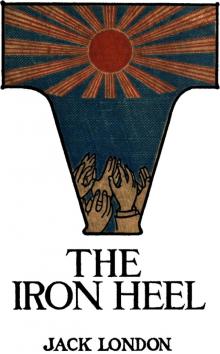 The Iron Heel
The Iron Heel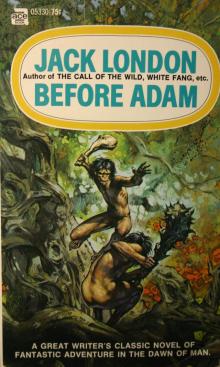 Before Adam
Before Adam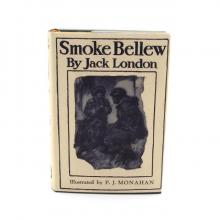 Smoke Bellew
Smoke Bellew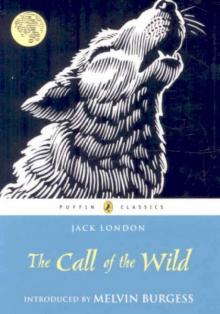 The Call of the Wild
The Call of the Wild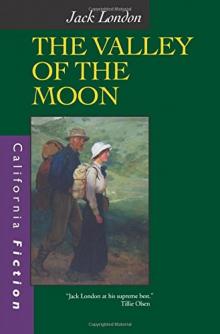 The Valley of the Moon Jack London
The Valley of the Moon Jack London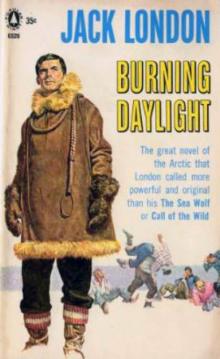 Burning Daylight
Burning Daylight The Sea Wolf
The Sea Wolf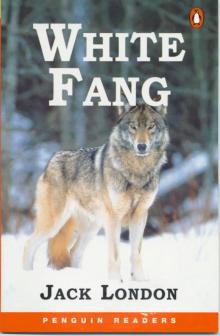 White Fang
White Fang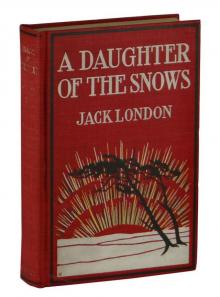 A Daughter of the Snows
A Daughter of the Snows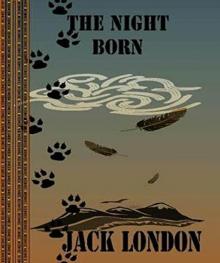 The Night-Born
The Night-Born A Son Of The Sun
A Son Of The Sun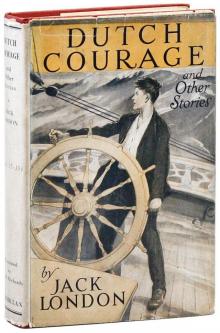 Dutch Courage and Other Stories
Dutch Courage and Other Stories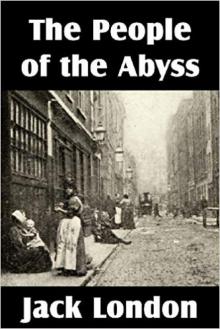 The People of the Abyss
The People of the Abyss Michael, Brother of Jerry
Michael, Brother of Jerry Love of Life, and Other Stories
Love of Life, and Other Stories Lost Face
Lost Face The Road
The Road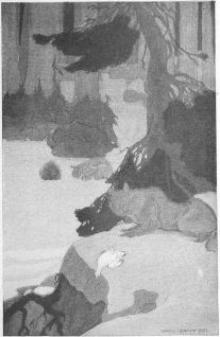 Love of Life
Love of Life The Turtles of Tasman
The Turtles of Tasman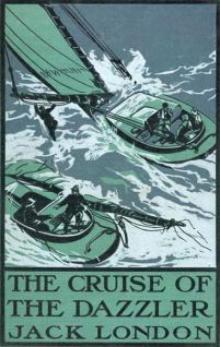 The Cruise of The Dazzler
The Cruise of The Dazzler The Heathen
The Heathen The Scab
The Scab The Faith of Men
The Faith of Men Adventure
Adventure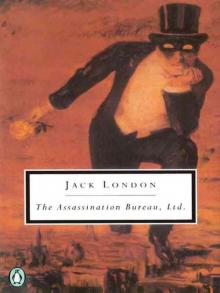 The Assassination Bureau, Ltd.
The Assassination Bureau, Ltd.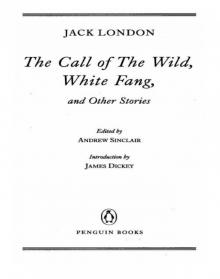 The Call of the Wild, White Fang, and Other Stories
The Call of the Wild, White Fang, and Other Stories The Call of the Wild and Selected Stories
The Call of the Wild and Selected Stories Jerry of the Islands
Jerry of the Islands Hearts of Three
Hearts of Three The House of Pride
The House of Pride Moon-Face and Other Stories
Moon-Face and Other Stories Children of the Frost
Children of the Frost South Sea Tales
South Sea Tales The Strength of the Strong
The Strength of the Strong The Jacket (The Star-Rover)
The Jacket (The Star-Rover) The Little Lady of the Big House
The Little Lady of the Big House John Barleycorn
John Barleycorn ADaugter of Snows
ADaugter of Snows The Mutiny of the Elsinore
The Mutiny of the Elsinore Northland Stories
Northland Stories Tales of the Fish Patrol
Tales of the Fish Patrol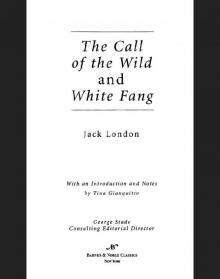 Call of the Wild and White Fang (Barnes & Noble Classics Series)
Call of the Wild and White Fang (Barnes & Noble Classics Series) The Valley of the Moon
The Valley of the Moon The Cruise of the Snark
The Cruise of the Snark The Game
The Game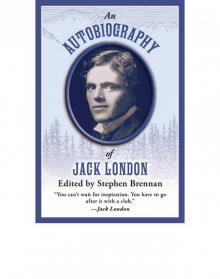 An Autobiography of Jack London
An Autobiography of Jack London